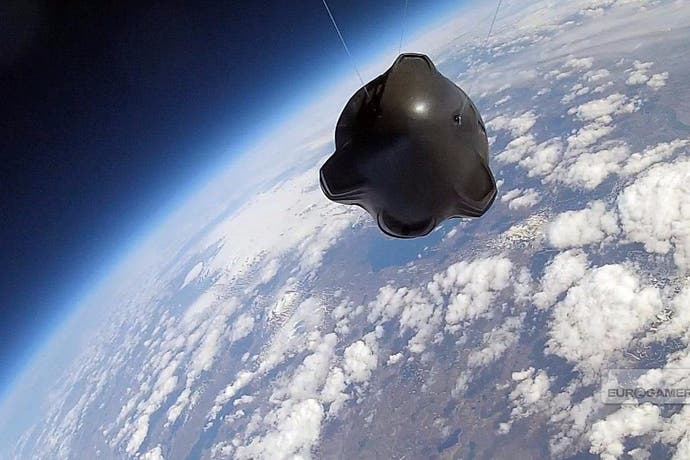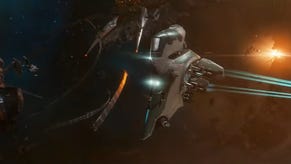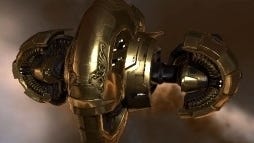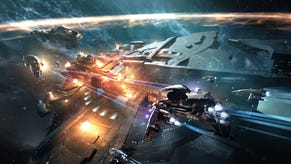I was patched out of Eve Online
What's next?
There's a scene in the US TV show The West Wing where Deputy Chief of Staff Josh Lyman, under pressure and about to lose a key Senate vote, is calmly reassured in the Oval Office by his boss, the President of the United States. "You know what the difference is between you and me?" President Bartlet asks. "I want to be the guy. You want to be the guy the guy counts on."
Deep into Season 4, Josh is a political fixer slowly coming to terms with the fact he can't solve every mounting problem the Bartlet Administration faces. The lasting appeal of The West Wing is its focus on the characters that form the machinery inside the White House - the stuff you usually don't get to see. It allows you to watch these unsung heroes toiling to achieve remarkable things.
As an Eve Online player, the experience of being a small cog in a bigger machine feels familiar. The ageing sandbox spaceship MMO has seen great player-run empires rise and fall as rivalries unspool over many years. When you read about the epic space battles of B-R5RB, 6VDT-H or Asakai, consider for a moment that everything must be player-built, that wars are not scripted plots but are groups of pilots in their thousands emerging into conflict. The sheer scale of the logistics involved boggles the mind and - if you are someone so inclined, like me - the appeal of Eve Online is being able to play a role in enabling these epic arcs to occur.
You will probably have heard of the go-to Eve personality known as The Mittani. Named consciously with the definite article, his character is the ultimate personification of The Guy. Able to mobilise thousands of players and move whole space-empires with a forum post or a speech uploaded to SoundCloud, The Mittani is the very definition of a human starting gun.
But I never wanted to be the guy. Famously, Eve Online is a hard game. Unforgiving to the newbie, it is incomprehensible to the vast numbers of people who have never actually played it. Somewhere along my own journey, I became an expert on much of the game's inner workings, a tour guide to the uninitiated, a fixer for those wanting to just focus on the big, fun stuff.
Not the guy, then, but the guy the guy counts on.
An Eve career can take many strange turns. Starting in 2009 during the Apocrypha expansion, I had no agenda other than finding out what this odd group of contrarian Icelanders had cooked up. In hindsight, this period was the start of Eve's second great act. Having to that point been formed from the dust of its own wild-west chaos where anything goes, Apocrypha ushered in a seemingly more structured and ambitious golden period for the game.
The Dominion expansion, released directly after that, introduced new mechanics and structures by which groups of player alliances were able to claim sovereignty over star systems and own space, and it was with these convoluted inner workings that I was to become almost uniquely familiar.
I say almost uniquely familiar because, it turns out, the role of managing strategic logistics in Eve Online appeals only to a very specific and particular type of madman. You would certainly not wish to undertake the job if you knew in advance what it entailed, and most players, upon discovering the implications, figuratively backed out of the room the moment they realised the commitment involved. Not me.
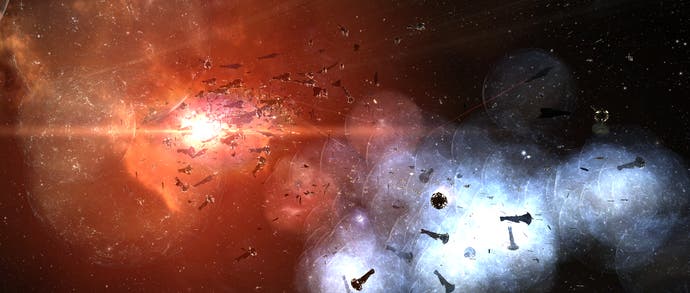
Dominion was an undocumented maze of half-built game design that CCP released with the best of intentions but then abandoned to let stand alone, creaking under its unfinished potential while they chased the next big thing - Incarna. Consequently, some six years after release, Dominion's mechanics had been gamed, exploited and leveraged to the point where wielding them effectively was a dark art to almost all players. So, armed with this seemingly rare knowledge, very small and tight-knit groups of players like me would work tirelessly in secretive paranoia (since such circles were often the first target of enemy spy operations), to deliver the various nefarious political, diplomatic and militaristic machinations of the guy calling the shots.
For example, in executing military campaigns to conquer new star systems, things could go horrendously wrong while reaching into Dominion's cogs and gears. The costliest battle in Eve's history, the battle of B-R5RB, was famously triggered by a routine sovereignty bill accidentally going unpaid while a vital staging system was in the temporary hands of a logistics corporation, like mine, which was used to configure the star system's local infrastructure. Controlling a cyno jammer, for example, (a defensive module that prevents Eve's large capital ships from being able to jump into the system) is just one of the key defensive advantages available to the star system's owner. But once that ownership drops, those advantages disappear and the system is free to be captured by anyone. And that's what happened at B-R5RB - Eve's two biggest coalitions fought to take advantage of the lapse and history was written. Here, people are counting on you and there is little room for error, but there is almost no one else willing or able to do the job.
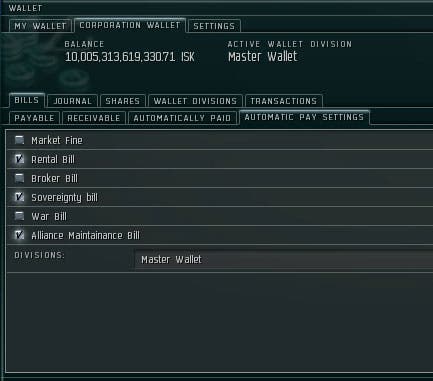
Would you enjoy the responsibility of managing the infrastructure for entire empires, directly impacting the gameplay of potentially thousands of players? How long would you last if it grew to become an all-encompassing, daily grind? What if your smallest mistake could cost your alliance the in-game equivalent of hundreds of thousands of dollars? And, having spent years developing the expertise to deal with the particular pressures of being the guy they count on, how would you react if everything you knew suddenly changed?
There was a developer blog published in March 2015 that read like a 'Dear John' letter written by CCP just for me. It clarified the design goals for the new mechanics that would finally replace Dominion in a patch release called Aegis, nicknamed Fozziesov after one of the designers. To the outsider, the blog reads like a user-manual for a nightmare, but the changes are not only needed, they are long overdue.
More recently, further major changes and additions to Eve are on the way, as part of the major Citadel expansion launching in spring 2016. In it, by starting to systematically overhaul all of the player-owned infrastructure in the game, CCP is gradually making Eve a better game as it moves step-by-step into its venerable third act. But in fixing their game, CCP is serving notice on the role of this particular fixer. The way I think of it is - I didn't leave Eve Online, Eve Online left me - and that's OK.
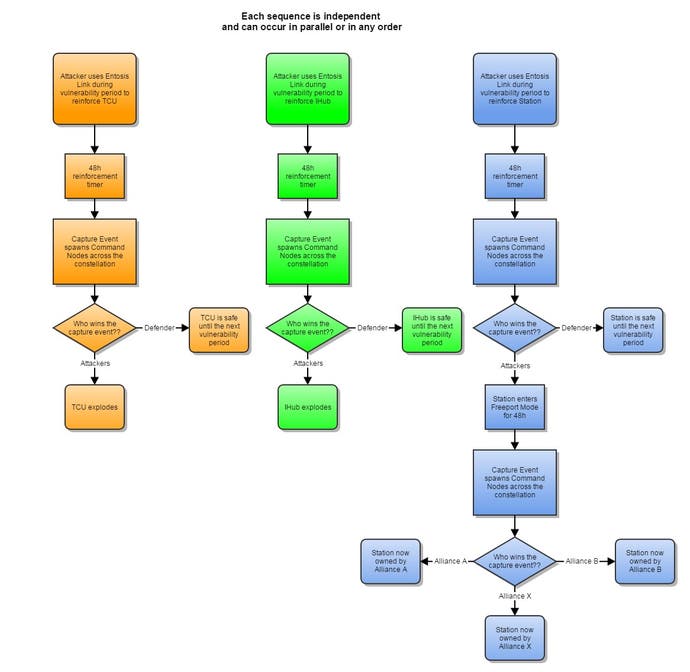
Stockholm syndrome speaks of the phenomenon where a captive develops a certain sympathy with their captor, a reliance on the daily routine of incarceration, even showing remorse at the prospect of that incarceration ending and an unwillingness to adapt to what might happen after release. It sounds strange, but that's where I was. Trapped by the obligations to an alliance I helped create, expert in game mechanics I did not care for and knowing that my expertise was timetabled for the scrap heap, but not having the energy left to change or adapt.
There is a joke that the only way to win Eve is to quit. But how do you quit Eve when people are counting on you? I mentioned to my alliance leader that I had some things on my mind. "Do you want to take some time out?" he asked reassuringly. "We don't want you to burn out, we're worried you are taking on too much." From that moment, armed with the slightest opportunity to be freed from my obligations, it was like someone had turned off a light. The game I had known for over six years had moved on, and it was probably time that I should too.
As Jed Bartlet would so abruptly say, "What's next?"
